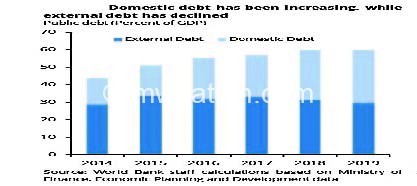Treasury u-turns on debt repayment freeze
The Ministry of Finance has shelved its plans to request for debt repayment suspension with international lenders, saying the move does not currently make sense.
In the face of the devastating economic impact of the Covid-19 pandemic, the International Monetary Fund (IMF) and the World Bank urged bilateral creditors to suspend debt repayment by the world’s poorest countries.

The former governing Democratic Progressive Party (DPP) administration applied to international lending partners to suspend loan repayments due to the economic challenges induced by Covid-19.
According to economists, the move could have seen the country save K16 billion annually in debt repayments and help to channel the resources to other areas.
However, Treasury under the new Tonse Alliance administration led by Lazarus Chakwera says the review of the debt suspension proved “the economy could pay dearly” if debt repayment was suspended than servicing it despite economic hiccups.
Malawi remains heavily indebted with national debt stock levels pegged at K4.1 trillion.
Ministry of Finance spokesperson Williams Banda said in an earlier interview that government officially wrote China and Kuwait, among other countries, to consider initiating the Debt Service Suspension Initiative (DSSI) as championed by the Bretton Woods institutions.
He said the request was to defer loan repayment from 2020 to 2022 when it is anticipated that the economy could recover.
But in an interview on Tuesday, Banda confirmed on Tuesday that so far, China responded positively to the request.
He said: “When we considered prevailing fundamentals, we decided to continue paying for the loans because already, the large chunks of the loans were repaid and what remains are minimal amounts.
“However, if the window of opportunity will still be available, government will consider re-applying to suspend repayments.”
Reacting to the development, Ben Kaluwa, a professor of economics at Chancellor College—a constituent college of the University of Malawi, said Treasury’s decision means government has to be prudent on how it manages its expenditures.
He observed that poor and irresponsible management of resources compromised government ability to repay the loans.
Said Kaluwa: “Non-payment of loans accounts for poor credit ratings by international lending institutions.
“If you are serious about growing your economy and show positive signals across the globe, you really have to safeguard your credit rating.”
He said by applying to suspend repayment of loans, it meant that Malawi was showing inability to service its loans, meaning its credit worthiness was poor.
“The credit rating is a serious business which it influences the ability of other nations to lend you money. When you fail to pay, it means that you do not have the capacity and people cannot trust you,” he said.
On his part, Centre for Research and Consultancy executive director, Milward Tobias, in a written response on Tuesday said he believes the decision is based on careful analysis.
“It is key to understand that debt repayment suspension is not debt cancellation. It is just postponing repayment to the future,” he said.
By December 2019, Capital Hill paid a total of K118.5 billion out of which total interest on external debt was K7.7 billion while that on domestic debt was K110.7 billion.
In the 2020/21 National Budget, government allocated about K300 billion for interest payment.
In 2006, Malawi benefited from debt relief under the Heavily Indebted Poor Countries and the Multilateral Debt Relief initiatives.




